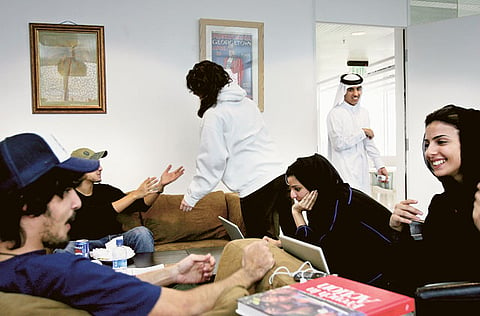Qatar invests in institutions for a post-carbon era
Five of the world's top universities have already opened campuses in Education City

Doha: Qatar, one of the world's richest states, is seeking to wean its dependency away from natural resources by injecting billions of dollars in education and luring some of the world's top universities to its shores, in a bid to ensure prosperity for its young population in a post-carbon age.
A tiny desert peninsula jutting into the Arabian Gulf from Saudi Arabia, Qatar is one of the wealthiest countries in per-capita income terms, thanks to its vast hydrocarbon riches. But while the emirate sits on the third-largest natural gas reserves behind Russia and Iran, and is the world's largest exporter of the fuel in its super-cooled form, the state's future lies in the development of its human resources, according to Shaikh Abdullah Bin Ali Al Thani, vice-president of Qatar's Education City.
"We are blessed with the wealth of oil and gas, and this is not going to last forever. We need to use that money wisely to invest in our people so they can help build Qatar economically in a sustainable way," Shaikh Abdullah said at a recent conference on education in the capital Doha.
Qatar's economy is predicted to grow at an impressive 21 per cent next year. Earlier this month, it surprised the world when it won the right to host the 2022 Fifa World Cup.
But away from the trophy investments that capture the international headlines, Qatar has also worked quietly on developing its giant Education City — a sprawling 15 million-square-meter campus with a planned capacity of around 100,000, whose centrepiece comprises some of the world's leading universities.
So far, Virginia Commonwealth University, Weill Cornell Medical College, Texas A&M, Carnegie Mellon, Georgetown School of Foreign Service and Northwestern — all from the US — have been hand picked to set up in Education City since the country began its hunt for the cream of western higher education in the late 1990s. In the summer, Hautes Etudes Commerciales Paris said it would offer a range of courses in Qatar, including MBA programmes. The latest addition is University College London, or UCL, one of the UK's oldest and most prestigious universities.
Stiff competition
Competition for places is fierce. Some 63 new undergraduates-of which 38 were Qatari-joined Virginia Commonwealth University, or VCU, this year and around 300 applied. Out of 1,300 applicants at Carnegie Mellon, 86 students, roughly a third of whom were Qataris, enrolled in the 2010-2011 year.
Some faculty members have complained of students with a poor grasp of English, a need to self-censor and curriculum interference.
"I think some of the universities have struggled to maintain the same standards as they have on their home campuses," said Lisa Clayton, a former assistant art history professor at VCU.
According to Murad Ezzine, World Bank education sector manager for the Middle East and North Africa, the question is whether universities will be as selective in their admission process in Qatar as they are in the US? "If you don't select at the same level you are not going to be able to maintain the same standards," he said.
However, Northwestern University President Morton Schapiro said in a statement to Zawya Dow Jones that "we expect our students in Doha to meet the same high standards for achievement as our USstudents, and the NU-Q students are fully meeting those expectations."
Money isn't the issue in Qatar. The government threw $4.76 billion (Dh17.48 billion), or 15 per cent of this year's dizzying $32.4 billion budget at education.
Still, a western style education in Qatar is expensive. Tuition fees for the 2010-2011 academic year at Qatar's Weill Cornell Medical College are $45,545 for the full medical programme, while the cost of year's tuition at Carnegie Mellon is $41,500, not including books, supplies and other additional fees. Even for a rich nation like Qatar, prices like these put higher education out of reach for some locals.
Cost aside, some experts also feel there is a risk of an overbearing emphasis on higher education.
Hidden danger
The World Bank's Ezzine says there is a "danger" in the case of Qatar that it is neglecting lower level education by shifting too many resources to higher education.
John Margolis, dean of Northwestern University, which offers a course in communications and journalism, insists there is no government interference with the curriculum.
Gary Wasserman, a professor of government at Georgetown University, says an issue with bringing "western education to Qatar is between seeing it as a commodity that can be bought as opposed to an intellectual process that can be encouraged".
"We are now tempting Qatar's leaders to see universities as a commodity."
Sign up for the Daily Briefing
Get the latest news and updates straight to your inbox

![Latest discovery follows several 1,000-tonne-plus gold finds in the past year. [Illustrative image]](http://media.assettype.com/gulfnews%2F2024-11-27%2F9rs31cwr%2FStock_Gold_Mining_18c61d0bfc2_original_ratio.jpg?w=320&auto=format%2Ccompress&fit=max)
